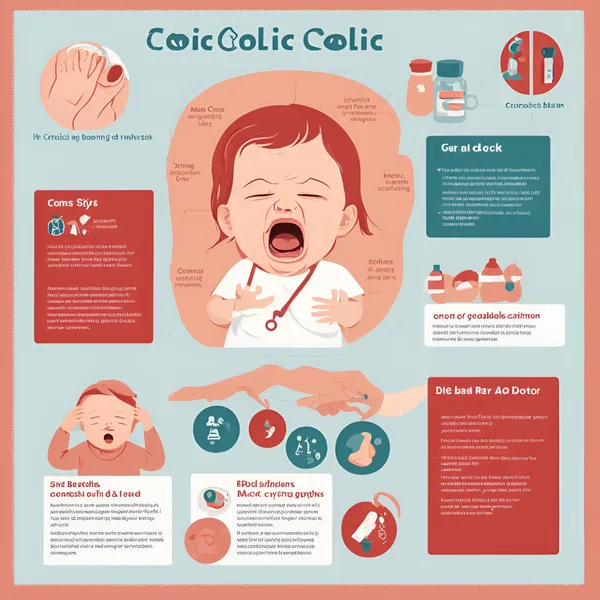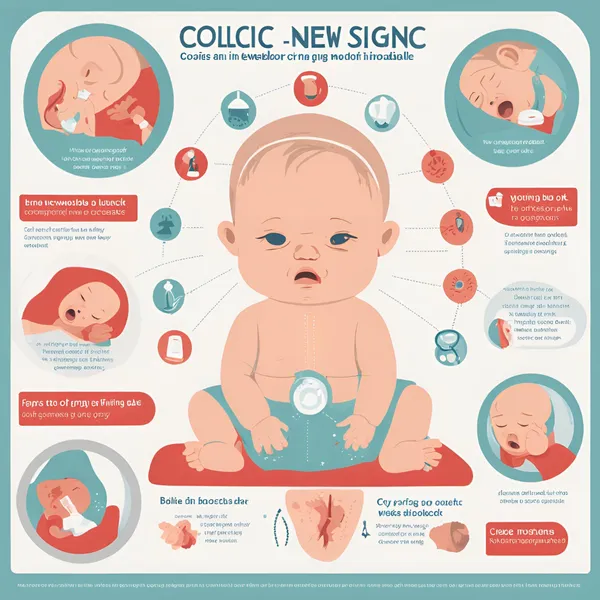Nothing can be as wonderful as the birth of a newborn baby, but with this come certain difficulties, which are especially at times when your baby too is colicky.
One common concern for new parents is understanding the signs of colic in newborns, a condition characterised by excessive crying in otherwise healthy infants.
Parents need to notice such symptoms to establish that there is a problem and to know how to comfort the baby. This article will discuss the key signs of colic in newborns to help you navigate this challenging period.
What is Colic?

Colic is described as prolonged crying or irritability in the baby after the first week of life, for more than three hours per day, more than three days a week, for not less than three consecutive weeks. : This is most often observed soon after birth, before the age of three to four months.
Key Signs of Colic in Newborns:
Recognising it is crucial for parents. Here are the key indicators:
Prolonged, Inconsolable Crying
The worst presentation of colic is that milk formula-fed babies cry hotly for many hours, frequently in the evening or just before twilight. This crying is much more problematic and cannot be silenced by conventional comfort.
Predictable Crying Patterns
Most babies experience colic symptoms, crying at a given time within the day or simultaneously on different days. While the specifics appear to be dictated by some fairly predictable factors, this can be aggravating or comforting as the parents foresee the child’s disruption.
Physical Manifestations
When crying, children may express a feeling of discomfort in their body signs which may be as follows:
- Flushed face
- Clenched fists
- Arched back or drawn-up legs
- Tense abdomen
Extreme Fussiness
Between crying times, colicky babies are usually irritable and may cry for what seems to be no reason.
Difficulty Soothing
While ordinary crying may be comforted by feeding, changing diapers or being held, the crying of colicky babies tends to be tougher and cannot easily be consoled.
Differentiating Colic from Normal Crying
When having a baby, you learn that all babies cry, which is their way of expressing themselves. However, there are key differences between normal crying and the Signs of Colic in Newborns:
- Normal crying is mostly associated with basic aspects of human life, such as hunger, tiredness, and dirty Diapers. Often, it is not as severe and much simpler to treat.
- Colic: A condition where the infant cries a great deal, often for long periods, at times with no obvious reason and which cannot be easily halted.
Possible Causes of Colic

The exact cause of colic remains unknown, but several theories exist:
- Digestive Discomfort: Its cause is usually considered ‘wind’, indigestion or food intolerances.
- Immature Nervous System: Some experts argue that colic could be caused by an immature nervous system that is not yet very good at self-regulating.
- Sensitivity to Stimuli: Sometimes, exposure to light, noise or exercise can cause a child to cry and become fussy.
- Early Form of Migraine: In recent studies, colic was reported to share a relationship with a type of migraine at an infant stage.
Soothing a Colicky Baby
They have several strategies:
- Swaddling can make the child feel secure in their environment or location.
- Gentle Motion: Swaying, rocking, or walking in the stroller or car can help.
- White NoisAg: a fan, a vacuum cleaner, or any white noise machine can help calm the place.
- Warm Baths: Warm baths help the muscles relax.
- Massage: At the molecular level, gentle infant massaging eases gassiness, helps digestion, and relaxes the baby.
- Pacifier: Giving the child a pacifier will help meet sucking needs and demands.
- Change of Scenery: Once in a while, moving from one location to another can help calm and make a baby stop crying.
Feeding Considerations
Breastfeeding Mothers
Avoiding any food products that might cause allergies or skin irritation, such as milk products, coffee and spicy foods, is recommended.
Checking with your doctor or a lactation specialist before making massive diet changes is always recommended.
Formula-Fed Babies
If you are bottle feeding, your child’s doctor may suggest that you switch to a hypoallergic or a sensitive formula.
When to Seek Medical Advice

While colic is generally harmless, it’s important to contact your paediatrician if:
- Your baby has a fever.
- Your baby has vomiting, or vomiting is forceful.
- You take your baby for a stool, and they have diarrhoea or bloody stool.
- Something is wrong with your baby; the baby is not gaining the right weight daily or refusing to eat.
- Some of the breaks you have for your baby are that you are worried about their general health.
The Course of Colic
This colic usually reaches its worst at around 6-8 weeks and will start easing at 3-4 months. Bear in mind that it is a stage. All those things are not permanent, and this shall pass someday.
Coping Strategies for Parents
Caring for a baby showing signs can be incredibly stressful. Remember to:
Take Breaks
Never underestimate yourself; asking your partner, family, or friends to support you is alright.
Prioritise Self-Care
Ensure that you are getting enough rest, getting your nutrition well, and caring for your body.
Seek Support
A therapist or any support group of parents with colicky babies.
Conclusion:
Understanding the signs of colic in newborns is crucial for parents. Please note that even though colic may be inconvenient for both the infant and the parents, it is an easily overcome condition.
By recognising the signs of colic and implementing appropriate soothing techniques, you can help your baby through this phase. Suppose you have any cons about your baby’s crying or suspect they are experiencing signs of colic. In that case, it’s always best to consult the paediatrician for guidance and support.
These details are meant for educational purposes only, and no medical advice has been given here. You must always seek your paediatrician’s opinion on any matter you have with your baby.


